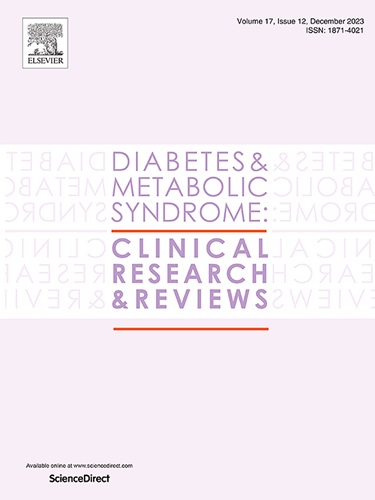使用二甲双胍和胰岛素治疗妊娠糖尿病的妇女后代的心脏代谢结果:系统回顾与荟萃分析
IF 3.4
Q1 ENDOCRINOLOGY & METABOLISM
Diabetes & Metabolic Syndrome-Clinical Research & Reviews
Pub Date : 2024-09-01
DOI:10.1016/j.dsx.2024.103134
引用次数: 0
摘要
简介妊娠期糖尿病(GDM)通常采用二甲双胍或胰岛素进行治疗,但这两种药物对后代心脏代谢结果的比较效应尚不完全清楚。方法采用预定义的检索策略,对 1974 年至 2024 年 5 月期间发表的文章(随机对照试验)进行系统文献综述。先筛选研究的标题和摘要,然后再筛选全文。结果在 5463 条记录中,纳入了五项研究(二甲双胍 = 409 名儿童或胰岛素 n = 434 名儿童)。通过生物阻抗和核磁共振成像,二甲双胍治疗的母亲的 5-9 岁子女的去脂质量(千克)和腹部(皮下和内脏)脂肪体积(立方厘米)均有所增加。二甲双胍治疗组 5-9 岁儿童的空腹血糖和甘油三酯较低。在其他心脏代谢结果方面未观察到明显差异。由于 5 岁以下儿童的数据有限,因此无法对现有结果进行荟萃分析,但体重除外,其差异也不显著。系统综述注册PROSPERO-CRD42023450990。本文章由计算机程序翻译,如有差异,请以英文原文为准。
Cardiometabolic outcomes in offspring of women treated with metformin versus insulin for gestational diabetes: A Systematic Review and meta-analysis
Introduction
Gestational diabetes mellitus (GDM) is commonly managed with either metformin or insulin, but their comparative effects on offspring cardiometabolic outcomes are not fully understood.
Objective
To investigate the impact of metformin and insulin, two distinct pharmacological interventions, on cardiometabolic outcomes in offspring of mothers with GDM.
Methodology
Systematic literature review was performed for articles (randomized control trials) published from 1974 to May 2024 using a predefined search strategy. Studies were screened for title and abstract followed by full text. Quality assessment was done using a separate risk of bias tool in line with the PRISMA-2020 checklist.
Results
Among 5463 records, five studies (metformin = 409 children or insulin n = 434 children) were included. Offspring of metformin-treated mothers in the age range of 5–9 years had more fat-free mass (kg) by bioimpedance and abdominal (subcutaneous and visceral) fat volume (cm3) by MRI. Fasting plasma glucose and triglycerides were lower in the metformin-treated group for offspring aged 5–9 years. No significant differences were observed for other cardiometabolic outcomes. Limited data available for offsprings less than 5 years of age precluded meta-analysis for the available outcomes, except for body weight, and difference for this was also not significant.
Conclusion
In short term no major differences has been seen in most of the cardiometabolic outcomes evaluated in the meta-analysis. Future trials with longer follow up are required and in different ethnicities.
Systematic review registration
PROSPERO-CRD42023450990.
求助全文
通过发布文献求助,成功后即可免费获取论文全文。
去求助
来源期刊

Diabetes & Metabolic Syndrome-Clinical Research & Reviews
ENDOCRINOLOGY & METABOLISM-
CiteScore
22.90
自引率
2.00%
发文量
248
审稿时长
51 days
期刊介绍:
Diabetes and Metabolic Syndrome: Clinical Research and Reviews is the official journal of DiabetesIndia. It aims to provide a global platform for healthcare professionals, diabetes educators, and other stakeholders to submit their research on diabetes care.
Types of Publications:
Diabetes and Metabolic Syndrome: Clinical Research and Reviews publishes peer-reviewed original articles, reviews, short communications, case reports, letters to the Editor, and expert comments. Reviews and mini-reviews are particularly welcomed for areas within endocrinology undergoing rapid changes.
 求助内容:
求助内容: 应助结果提醒方式:
应助结果提醒方式:


